“A low sound, barely audible at first, made him turn his head. For a moment he seemed almost puzzled. The sound was faint but growing and unmistakable, like distant thunder. It was engines, wide open. They were as if headed towards him. He could hear them, full and unwavering, suddenly very close, almost overhead, roaring down the runway, low, but in the clouds. He never saw them. Then they had passed, but the sound stayed there, heavy and prophetic, before slowly fading, leaving silence behind.” — James Salter, Cassada
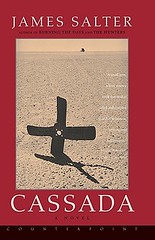 Cassada
Cassada
James Salter
![]()
Salter was there long before me, two wars — Korea and Vietnam — earlier, but judging by my experiences at USAF fighter squadrons in Germany and the Netherlands in the late 1970s and early 1980s, things in my day were no different than in his, and he has captured it exactly.
I know Salter’s pilots. I know their wives. I know the solitariness of flying single seat jets, one of the most individualistic of military occupations. I know the weather in Europe, and how it can suddenly go below minimums everywhere at once. I know what it is to be the new guy, minutely observed in everything you do as you strive to become accepted as a fighter pilot among fighter pilots. I also know what it is to be a seasoned squadron member, closely observing and making judgments on green lieutenants. I know what it is to see a new guy realize he’s not cutting it and will never fit in, and the haunted look in his eyes. I know what it is to lose a fellow pilot — weak or strong — and the profound effect it has on squadron mates, supervisors, and commanders.
Salter was there, and by our great good fortune has the gift of being able to write about it in a direct, spare, yet very personal way. The central drama of the book centers around a new guy, Cassada, in an F-86 squadron in Germany. The climactic event of the story seems on the surface mundane: Cassada, still an inexperienced wingman, is forced to take the lead when lead’s radio fails above terrible weather which has suddenly shut down almost every airfield in Germany, Spain, and France, and with fuel running low must take the flight down to absolute minimums to find the only runway they can land on. Having been in similar situations, I unconsciously tensed up as I read, and was emotionally exhausted when I finished the book — which I devoured in one intense sitting. Damn.
Salter not only makes me want to fly again, he makes me want to write. I mean that as high praise. Just as I admired the fighter pilots who had mastered their craft, looking up to them and striving to be like them when I was wet behind the ears, so I admire and strive to write half as well as James Salter.
 The Zone of Interest
The Zone of Interest
Martin Amis
![]()
The Holocaust still has the power to punch you in the gut. I don’t think we’ll ever get used to the fact of it; that it not only happened but was conceived, organized, and carried out by people not unlike us. A love story and novel of manners set in the inner management circles of Auschwitz is a sly way to approach the subject, but the net effect is the same: it knocks the wind right out of you.
The good, highly readable Martin Amis is at work here; The Zone of Interest is a guilty pleasure, one of the more interesting and engaging novels I’ve read in some time.
The characters are, I believe, fictitious, but appear to be based on historical figures involved in the administration of the Auschwitz death camp and the nearby IG Farben Buna Werke, an industrial plant being built with concentration camp labor in order to produce synthetic rubber and oil for the Nazi war machine. Some of the horrors of the Nazi’s extermination programs are explicit and central to the novel, but many occur just off the page and are incidental to the plot, thus hitting the reader in a series of stealthy blows, administered when no one is looking, leaving bruises on parts of your body that won’t be noticed by others.
Another Goodreads reviewer pointed to a superficial similarity between The Zone of Interest and television’s The Office; the comparison is apt in that we’re privy to the thoughts and recollections of a few central characters who have quite different, sometimes deluded, perceptions of what’s going on. And yes, like The Office, the conflicts between what characters choose to see and what actually goes on is the source of humor, and that’s where most of the guilty pleasure of reading this novel comes from.
It’s clear Amis has researched his subject in depth. He’s just as shocked as his readers, and doesn’t try to hide it.
My overall reaction to The Zone of Interest? Brilliant and deeply disturbing.
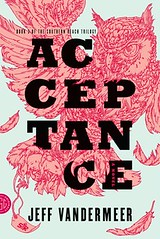 Acceptance (Southern Reach #3)
Acceptance (Southern Reach #3)
Jeff VanderMeer
![]()
Acceptance, the third book of the Southern Reach trilogy, doesn’t close the circle, but what could? The entity in Area X is unknowable, even by those who have seemingly become part of it: the lighthouse keeper, the biologist, Control. And because it is unknowable, we can’t understand why it’s here and what it’s doing, or even if it is consciously doing anything other than being. As I said in my review of the first book, Annihilation, “I’ve always felt that if we ever encounter something truly alien we won’t be able to understand what we’re seeing; our minds will instinctively reject it and we might not even be able to look directly at it. Such is the case with whatever is growing inside Area X.”
Unclosed circle or not, Acceptance is a brilliant finish to VanderMeer’s story. I accept what I cannot understand. The problem right now is how to review the book without retelling the story. I can’t and won’t, no worries.
VanderMeer has written a remarkable story; it is both the stuff of dreams and reality, from shifts in physical location and time to the smell of reeds and decomposing vegetation in brackish tidal water, from visions of destroyed worlds and the limbo-like fate of previous expedition members to village life in the pre-Area X “forgotten coast.”
Area X is in my head now, and isn’t going anywhere. I’ll remember these books for a long time to come.
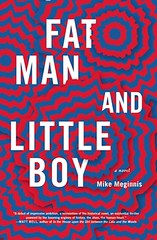 Fat Man and Little Boy
Fat Man and Little Boy
Mike Meginnis
![]()
I struggled to assign meanings to characters and events in Fat Man and Little Boy, all the while aware that attempting to do so was wrong-headed and futile. Little Boy and Fat Man, the Hiroshima and Nagasaki atom bombs, born as human brothers at the moment of their detonations, three days apart? Sure. Extinguished Japanese souls attempting to be reborn, literally under the brothers’ feet? Okay. But what am I to make of the policemen, the short and the tall one? What do they represent? And for that matter … why France, why Masumi, why Rosie and Magnolia and Able and Baker?
What if this were a straight novel about odd, parentless, horribly filthy brothers who move from wartime Japan to post-war France, find a family and gradually become functioning humans, then take a short vacation in Hollywood? It wouldn’t pass muster. It wouldn’t be interesting. It wouldn’t justify its own existence. The conceit of atomic bombs exploding and being born as human brothers is what makes this novel worth reading. But where is Meginnis going with this conceit?
Questions upon questions! Fat Man lives with guilt, but why doesn’t Little Boy? Or are Little Boy’s physical failings the manifestation of guilt? The profuse life Fat Man and Little Boy spread about them is at first deformed and unviable, paralleling the effects of radiation in the survivors of the bombings and following generations. But why then, over time, do Fat Man and Little Boy’s progeny become normal and healthy?
Today many consider the atomic bombing of two Japanese cities a criminal act, but it was hardly considered so in 1945 or for many years afterward; it ended a horrific war that would have gone on to kill even more people than if the bombs not been used. Is that the meaning of the happy, well adjusted, celebrity actors Able and Baker? Are the former Vichy French Jewish internment camp and the frequent mentions of Marshal Pétain meant to force a comparison between the atomic bombing of two Japanese cities with the deliberate conduct of genocide by the Nazis and their puppet states?
But I babble. I’ve finished a book with more questions than I had when I started it. I could say the central conceit of the book doesn’t hold together, leaving readers frustrated and adrift. I could say the book is more poetry than novel, beautifully crafted despite its ambiguities, forcing readers to think and wonder. I choose the latter.
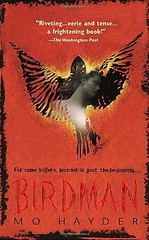 Birdman (Jack Caffery #1)
Birdman (Jack Caffery #1)
Mo Hayder
![]()
This is the first of Mo Hayder’s Jack Caffrey crime novels, and the second one I’ve read. Overall, I’ve been up and down with Mo Hayder. The other Jack Caffrey novel I read, Ritual, was readable but didn’t make much of an impression on me, other than the horrific cave-like flooded and buried canal one of the female characters found herself trapped in. Another novel, Pig Island, was laughably silly. The Devil of Nanking, however, was quite good, as is Birdman.
What all Mo Hayder novels seem to have in common is the author’s love of evil villains, and by evil I mean horrifically so: she specializes in gothically elaborate scenes of torture, bodily mutilation, spiritual humiliation … if it’s X-rated human evil you’re after, Mo’s your girl. She’s comfortable with her sadistically twisted bad guys, and has a knack for making readers shiver. As for the good men and women who pursue her unspeakable villains, she gives them life. You don’t find paper cutout characters in a Mo Hayder novel.
While Hayder’s stories are up and down, her writing is uniformly good, and I confess to a slight addiction. I’ll be back for additional chills and shivers.
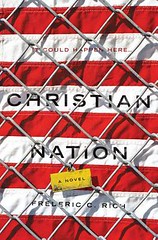 Christian Nation
Christian Nation
Frederic C. Rich
![]()
An interesting essay, in the form of a novel, about how the Christian dominionist movement might take the reins of power in the USA. As I started reading I thought of Sinclair Lewis, who in 1935 wrote a famous novel titled It Can’t Happen Here; I was not surprised, a few chapters into Christian Nation, to see references to Lewis’s satirical novel.
Christian Nation might have been readable as a satirical novel. Instead, it’s an earnest, long-winded polemic with paper-thin characters who all talk the same, and I couldn’t help but be reminded of another author: Ayn Rand. As I progressed through Christian Nation, I found myself flipping through page after page of fictional speeches and addresses, much as I once flipped through the dreadfully tedious pages of Atlas Shrugged.
The trouble is, I’m fascinated by the possibility of a Christian dominionist or fascist takeover (take your pick; they’re much the same thing), and I wanted to see how Frederic Rich thinks such a thing could play out, so I made a mental adjustment and began reading Christian Nation as an essay, picking out the steps and stages whereby his fictional dominionists come to power and impose their theocracy upon the USA.
I say fictional domionists, but the first half of Christian nation, which deals with the years between 2001 to 2008, is pretty solidly based on the actual history of the movement and peopled with living characters: Ralph Reed, John Ashcroft, Tom Coburn, Ted Cruz, John McCain, Sarah Palin, the founders of Christian “colleges,” leaders of the homeschooling movement, prominent creationists … people whose words and deeds we can follow in the news today, people who’ve made no secret of their desire to see America become a Christian theocracy. As Rich says at the conclusion of his first chapter: “They said what they would do, and we did not listen. Then they did what they said they would do.”
I saw men and women like this begin to take control of US Air Force leadership in the 1980s and 1990s (they appear to have solidified their grip in the years since I retired). The Air Force Academy, from which these leaders come, sits in Colorado Springs, a hub of pentecostalism in the USA. For the past few years I’ve been writing a regular column on book banning in the USA, and as a result have become sensitive to attempts by the religious right to dictate what is taught in public schools, not just creationism and the belittling of science but also the whitewashing of history in accordance with the doctrine of American exceptionalism. In other words, I study dominionists in real life and have become something of an alarmist; in Frederic Rich I find a fellow alarmist.
Christian Nation is an interesting exercise in what-iffing. It’s a bad novel, though, which explains my relatively low rating. A book like this needs to readable if people are going to read it, and I think only people who share Rich’s concerns are likely to wade through it. It’s instructive to look at reader reviews from religious right readers on Goodreads and Amazon: they leave one-sentence denunciations stating how much they hate it, calling it leftist crap. One can safely assume they didn’t read more than a few pages. People like that would love to take charge of what we’re allowed to read and learn … and they will if we let them.